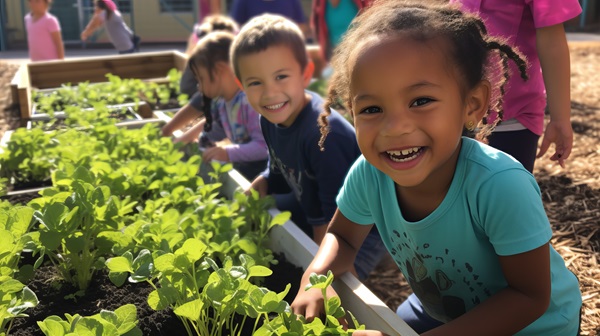Empowering learners for a sustainable future: a whole-school approach

Schools have a responsibility to prepare learners to adapt to these changes but also to develop the competences needed to transition towards a more sustainable future.
Thirty years of environmental learning in schools has taught us that the most effective way to engage learners with sustainability is to adopt a whole-school approach. This enables pupils to live as well as learn sustainability at school. Schools that choose this approach connect what pupils gain through the curriculum with their school’s practice in its canteens, corridors and outdoor areas.
Many have retrofitted their buildings to align with sustainability, and others have invested in technology that helps them become more sustainable by generating their own energy. They may grow food on their grounds, harvest water for reuse or change their school uniforms to ones that are produced more sustainably.
The successful schools have found ways to connect these developments directly to the pupils’ formal learning experiences. They also provide hands-on learning: indoors, outdoors and in the community, so that pupils can grapple with the practical realities of this agenda and not just the thinking behind it.
A whole-school approach is not simply about connecting different aspects of the school so that they align with sustainability. It is also about redesigning pupil experiences so that they can meaningfully develop competences that enable them to contribute to the green transition. Often, this process starts with envisioning exercises that engage the learner in thinking about the future and motivate them to consider how today’s actions have long‑term consequences.
Creating spaces in which pupils can experience responsibility and decision-making is also key to this agenda. It means engaging pupils in school decisions, involving them in community projects and connecting them to global initiatives.
Pupil empowerment is a key aspect of a whole-school approach, which recognises that building confidence and experience can help replace the sense of fear and powerlessness that many face when confronting sustainability issues. Educators can use the European sustainability competences (GreenComp) to develop pupil competences such as ‘envisioning sustainable futures’, ‘embodying sustainability values’, ‘embracing complexity in sustainability’, and ‘acting for sustainability’.
The most successful schools have established a culture of sustainability that broadens the contribution of individual champion teachers, who are often seen to be engaging in islands of good practice. They also seek cooperation with the broader community in joint efforts to establish projects that support the transition to sustainability (such as regenerative cafes and community allotments) and in transforming the school environment into a sustainable learning space.
Core questions can be asked and answered by the school team to establish whether the school has adopted a whole-school approach to sustainability:
- What is taught (curriculum, hidden curriculum)?
- Where does learning take place (classroom, canteen, campus, community)?
- Who do we learn from (teachers, school staff, parents, community)?
- How is learning taking place (action learning, participatory learning, critical reflective learning, values clarification)?
- Is there a culture of sustainability in the school? Can staff and pupils see the alignment between the what, where, who and how?
It is also worth noting that a whole-school approach is relevant to other areas of educational interest (such as digital education and gender mainstreaming) and has a long tradition in supporting schools as learning organisations. Indeed, there many documented experiences that show how bringing these agendas together can help advance the transformative agenda in schools.
Prof Daniella Tilbury is a policy expert, educator and change-maker credited with having developed the initial frameworks on education and learning for sustainability. Daniella was a member of the Board of WWF Australia that brought Earth Hour to the World in 2007 and has been actively involved in international initiatives that inspire transitions towards sustainability and climate positive futures. She is currently an Hon. Fellow of St Catharine’s College, University of Cambridge, an adviser to the European Commission on learning for sustainability and the UK government’s focal point at the UN Economic Commission for Europe on matters of education and environment.
Additional information
-
Education type:School Education
-
Target audience:TeacherStudent TeacherHead Teacher / PrincipalTeacher EducatorGovernment staff / policy maker
-
Target audience ISCED:Primary education (ISCED 1)Lower secondary education (ISCED 2)Upper secondary education (ISCED 3)
